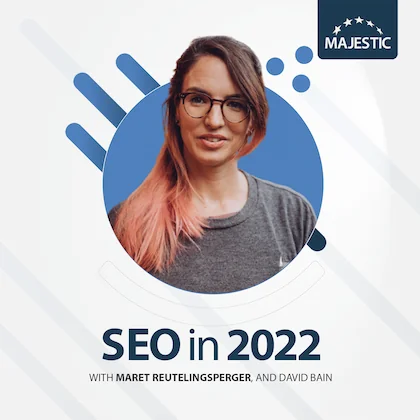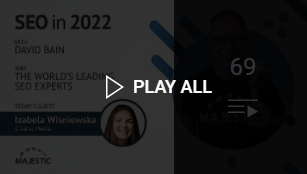-
Site Explorer
- Majestic
- Summary
- Ref Domains
- Backlinks
 New
New Lost
Lost- Context
- Anchor Text
- Pages
- Topics
- Link Graph
- Related Sites
- Advanced Tools
- Author ExplorerBeta
- Summary
- Similar Profiles
- Profile Backlinks
- Attributions
- Compare
-
Link Tools
- My Majestic
- Recent Activity
- Reports
- Campaigns
- Verified Domains
- OpenApps
- API Keys
- Keywords
- Keyword Generator
- Keyword Checker
- Search Explorer
- Link Tools
- Bulk Backlinks
- Neighbourhood Checker
- Submit URLs
- Experimental
- Index Merger
- Link Profile Fight
- Mutual Links
- Solo Links
- PDF Report
- Typo Domain
- Free SEO Tools
-
Support
- Blog

- Support
- Get started
- Tools
- Subscriptions & Billing
- FAQs
- Glossary
- How To Videos
- API Reference Guide

- Contact Us
- About Backlinks and SEO
- SEO in 2024
- Link Building Guides
- Webinars
- Blog
Create topic clusters that talk to each other
Maret Reutelingsperger
Maret wishes to emphasise the importance of forming relationships between the different content pieces that you publish.

Create topic clusters that talk to each other
Maret says: "Create topic clusters which are useful for the people visiting your website, and make sure that they talk to each other."
How do you define topic clusters?
"Topic cluster is quite a loaded term. It's a phrase that people like to throw around in digital marketing and SEO quite often. All it really means is creating content that's useful for your potential buyers - the people visiting your website - and categorising it, so that search engines can easily understand that all of the different pieces of content are linked."
What's the optimum way of forming a topic cluster?
"The traditional way of creating a topic cluster is to start with a big, evergreen long-form page that is about the overall topic. That page can then bring together a lot of information and link out to many different articles that go into more detail about the topic. You will then have a long, authoritative piece of content, and lots of smaller articles about subtopics that point to the larger one. Often people feel that creating topic clusters requires a complicated strategy, and a well-thought-out plan. However, most companies that have done keyword research have essentially already created some topic clusters, by categorising keywords into different tabs."
How do you decide on the most rewarding topic cluster to start building?
"Part of that will come back to keyword research. See whether there is a lot of search volume for a particular overall topic that you want to share with your audience. Something that can also really help is understanding whether there is a lot of competition, and a lot of other companies writing about the topic. Even if search volume is lower, the content being relevant to your audience is what is most important."
How do you define relevance, and can that process be automated?
"There are ways of automating, but mainly it's a case of knowing the business that you're working with, or for. You need to understand what the goal of the company is. If the goal of the company is to sell red shoes, you can write about 'tea' as much as you like, but it's not going to help you sell red shoes. Knowing the company will help you understand what information they want to share.
Keyword research can also help focus your mind on what types of content people are looking for. In doing this research, make sure to use tools like AlsoAsked and AnswerThePublic to really find the best topics."
How do you predict the topics that people are going to be looking for in the future?
"Seasonality is definitely trackable. You can use Google Trends, for example, or you can see how certain pages on your website have performed in the past. You can also keep track of new product releases in a sector, look at different serial numbers that have been released, and think about what is going to be successful at some point in the future."
How do you make topic clusters that talk to each other?
"Often people portray topic clusters as a big page in the middle, with lots of subpages, articles, FAQs, and blogs around it. You need to make sure that it's not just a spiderweb of that big topic linking out to all these separate articles. You want to link in between the articles, where relevant, as well. If you have three different articles about trainers, on 'Best Trainers for On-the-Road', 'My Trainers Are Not Giving Me the Support I Need', and 'Best Places for Running Off-Road' for example, they will all sit under the topic cluster of 'running trainers'. They can also link to each other.
Topic clusters talking to each other is the next step. You can take the topic cluster of 'running trainers', and a second topic cluster of 'fancy shoes', and link them. It's like a Venn diagram. Although they might not seem to have that much in common, you could use some articles like 'Shoes for Any Occasion', or 'How to Go from Daywear to Nightwear', to bring them together. You don't need many articles like these, but they can overlap and link both topic clusters. That's how they can start talking to each other."
Should you be aiming to have all of your articles link with other content within their own topic clusters, and to other topic clusters as well?
"Not every article has to necessarily link to another topic. Just make sure that there are some articles in each topic cluster linking to articles in a different topic cluster - where it fits. It's better if it's not on every page, and in every article, but where it makes sense. You want to be creating a beautiful internal linking structure. Then, if you're introducing a new product, you have an existing topic cluster that you can utilise, which is already strong and already internally linking to other clusters. Even if your new products are in a different topic cluster, having that infrastructure internally might help boost them up in the rankings faster."
Is it more important to link from existing clusters to new ones, as opposed to the other way around?
"If you're talking about a new product, then yes, because it's the existing authority for each page that can help rank the new product quicker. Overall, it's something that should be reviewed relatively regularly, maybe every quarter, to make sure it's being done effectively. It's not just a case of making sure that the infrastructure keeps growing, but also that the internal links are all still right, and you're not ending up with 404 pages or 301s."
Do you have any other rules about where links are located?
"Search engines get quite clever nowadays. The main thing is to make sure that you give a contextual anchor text, so that it makes sense within the article, and it makes sense to the article you are taking them to. You should be more concerned with the context than with the keywords in the link or the position on the page."
Will content writers need to be given a lot of guidance to optimise the topic clusters effectively?
"It depends. I have some clients that are very rigorous with their briefing. You might use a template, which is great because it's always the same. That can include things like the overall topic keywords to focus on in the page, and the internal links to push to. The only danger with that strategy is that you will only ever link to already existing pages, which means that newer pages will always be behind. This is why you need to make sure that you are regularly reviewing your clusters."
What is something that SEOs should be doing less of to focus more on building their topic clusters, and getting them to talk to each other?
"One of the areas where you can save some time is very well-known: 'keyword stuffing'. It's the situation where you have extensive documents with keyword research, and you try to fit all the different relevant keywords into a page. Search engines nowadays are more than clever enough to understand the semantics, and that different phrases fall into the same bucket. Don't waste time forcing as many relevant keywords into one page as you can. When you are convinced that topic clusters that talk to each other are the way forward, and if you have any questions, please feel free to come and find me."
You can find Maret over at MOBEdigital.com.
Choose Your Own Learning Style
 Video
Video
If you like to get up-close with your favourite SEO experts, these one-to-one interviews might just be for you.
Watch all of our episodes, FREE, on our dedicated SEO in 2022 playlist.
 Podcast
Podcast
Maybe you are more of a listener than a watcher, or prefer to learn while you commute.
SEO in 2022 is available now via all the usual podcast platforms
Don't miss out
Opt-in to receive email updates.
It's the fastest way to find out more about SEO in 2025.
Could we improve this page for you? Please tell us





